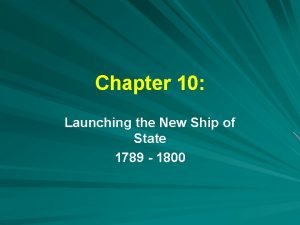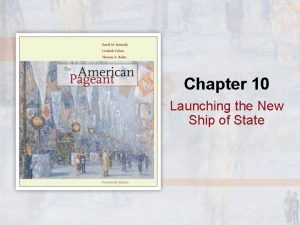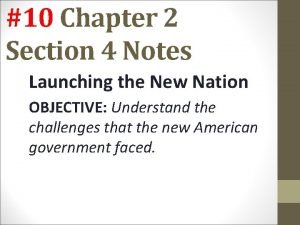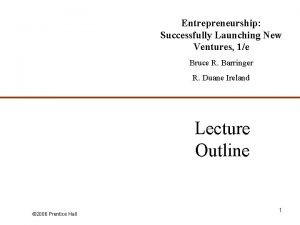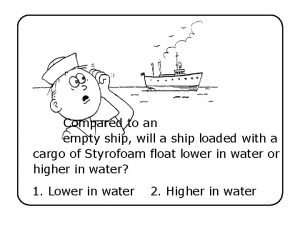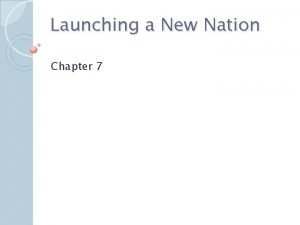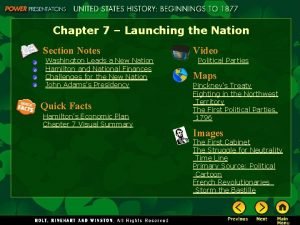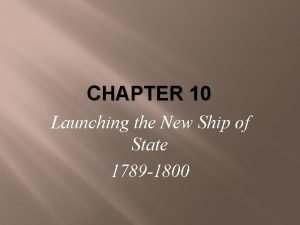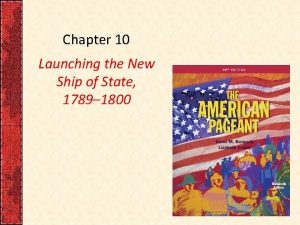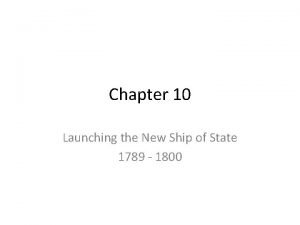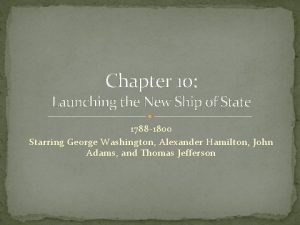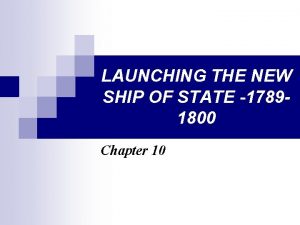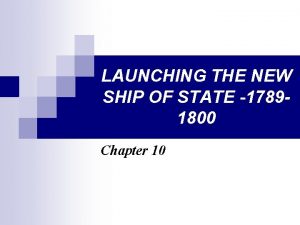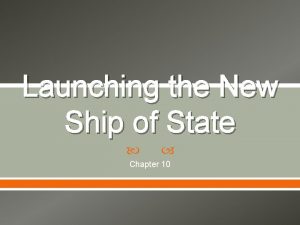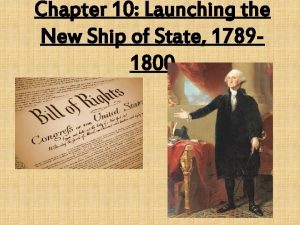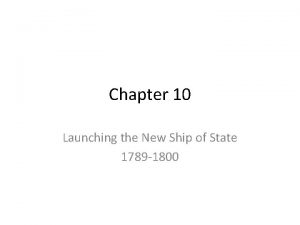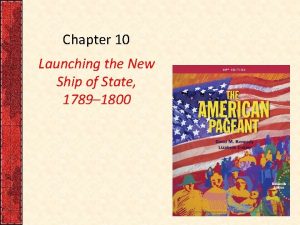Chapter 10 Launching the New Ship of State
















- Slides: 16

Chapter 10: Launching the New Ship of State 1789 - 1800

A New Ship on an Uncertain Sea 1789 – U. S. Constitution was launched – population was doubling every twenty years America’s population was still 90% rural – 5% west of the Appalachians Vermont became the 14 th state in 1791, and Kentucky, Tennessee, and Ohio (states where trans-Appalachian overflow was concentrated) became states soon after Foreigners looked down on the new country America was also heavily in debt – paper money was worthless – restless monarchs watched to see if the U. S. could succeed in setting up a republic while facing such overwhelming odds

Washington’s Pro-federalist Regime George Washington was an imposing figure--unanimously drafted as president by the Electoral College in 1789 Washington established a diverse cabinet (which was not necessary, Constitution-wise) – Secretary of State: Thomas Jefferson – Secretary of the Treasury: Alexander Hamilton – Secretary of War: Henry Knox

The Bill of Rights Many states had ratified the Constitution on the condition that there would be a Bill of Rights-The necessary number of states adopted it in 1791 – Amendment I: Freedom of religion, speech or press, assembly, and petition. – Amendment II: Right to bear arms (for militia). – Amendment III: Soldiers can’t be housed in civilian homes during peacetime. – Amendment IV: No unreasonable searches; all searches require warrants. – Amendment V: Right to refuse to speak during a civil trial; Double Jeopardy. – Amendment VI: Right to a speedy and public trial. – Amendment VII: Right to trial by jury when the sum exceeds $20. – Amendment VIII: No excessive bails and/or fines. – Amendment IX: Other rights not enumerated are also in effect. – Amendment X: Non-federal powers belong to the state

The Judiciary Act o f 1789 created effective federal courts. – John Jay became the first chief justice of the United States Hamilton Revives the Corpse of Public Credit Urged federal government to assume its debts ($54 million) try to pay them off at face value, PLUS interest--“Funding at Par” as well as assume the debts of the states ($21. 5 million) – Massachusetts had a huge debt, but Virginia didn’t, so there needed some haggling – Virginia felt it unfair that all debts were to be assumed, instead of just a set amount – Virginia would have the District of Columbia built on its land (therefore gaining prestige) in return for letting the government assume all the states’ debts

Customs Duties and Excise Taxes national debt at a huge $75 million – – – As of 12/6/2011 $15, 086, 255, 317, 559 http: //www. usdebtclock. org/ used the debt as an asset: the more people the government owed money to, the more people who would care about what would happen to the U. S. To pay off some of the debt, Hamilton first proposed custom duties – imposing a low tariff of about 8% of the value of dutiable imports, was passed in 1789 – 1791 - Hamilton secured an excise tax on a few domestic items, notably whiskey (7 cents per gallon)

Hamilton Battles Jefferson for a Bank Hamilton proposed for a national treasury – to be a private institution modeled after the Bank of England – have the federal government as a major stockholder circulate cash to stimulate businesses store excess money print money that was worth something opposed by Jefferson Hamilton vs. What was not forbidden in the Constitution was permitted A bank was “necessary and proper” (from Constitution). He evolved the Elastic Clause Jefferson What was not permitted was forbidden bank should be a state controlled item (9 th Amendment). The Constitution should be interpreted literally and strictly

End result: Hamilton won, and Washington reluctantly signed the bank measure into law Bank of the Untied States was created by Congress in 1791, and was chartered for 20 years – located in Philadelphia and was to have a capital of $10 million. – Stock was thrown open to public sale, and surprisingly, a milling crowd oversubscribed in two hours Mutinous Moon-shiners in Pennsylvania 1794 - the Whiskey Rebellion flared up in PA when fed up farmers revolted against Hamilton’s excise tax (everyone hates taxes) – – – liquor and alcohol was often used as money. Washington cautiously sent an army of about 13, 000 troops Anti-federalists criticized the government’s use of a giant to crush a gnat

Emergence of Political Parties Hamilton’s policies had seemed to encroach on states’ rights rivalry between Hamilton and Jefferson gradually evolved into two political parties – Jeffersonian Democratic-Republican – Hamiltonian Federalists Founding Fathers had not envisioned various political parties – (Whigs and Federalists and Tories, etc… had existed but they had been groups, not parties) – Washington disliked political parties Said that people might vote for/against something just because of a party issue (known as Partisan Politics)

Impact of the French Revolution first stages of the revolution were not unlike America’s dethroning of Britain (thought our ideas were spreading) few ultraconservative Federalists were upset at this “mobocracy” and revolt the revolution turned radical and bloody America was sucked into the revolution when France declared war on Great Britain and the battle for North American land began…again

Washington’s Neutrality Proclamation (Jeffersonian Democratic-Republicans) wanted to enter on the side of France Washington knew that war could mean disaster and disintegration 1793 - he issued the Neutrality Proclamation – proclaiming the U. S. ’s official neutrality and warning Americans to stay out of the issue and be impartial – Americans ended up getting it from both sides by trying to stay out of it Embroilments with Britain supplied the Indians with weapons (on U. S. soil) British commanders of the Royal Navy seized about 300 American merchant ships and impressed scores of seamen into their army Many JDR’s cried for war with Britain, or at least an embargo – Washington refused, knowing that such drastic action would destroy the Hamilton financial system

Jay’s Treaty and Washington’s Farewell last-ditch attempt to avert war – Washington sent John Jay to England to work something out negotiations were sabotaged by Hamilton, who secretly gave the Brits the details of America’s bargaining strategy results weren’t pretty: – Britain would repay the lost money from recent merchant ship seizures – it said nothing about future seizures, impressments, and Indians arms supplying – America would have to pay off its pre-Revolutionary War debts to Britain Result: the JDR’s from the South were INCENSED as the southern farmers would have to pay while the northern merchants would be paid After his second term, Washington stepped down, creating a strong two-term precedent that wasn’t broken until FDR was elected – His Farewell Address warned against binding, permanent alliances – Washington had set the U. S. on its feet and had made it sturdy

Adams Becomes President Alexander Hamilton was the logical choice to become the next president, but his financial plan had made him very unpopular John Adams, the ablest statesmen of his day, won, 71 to 68, against Thomas Jefferson, who became vice president – Adams had a hated rival and opponent in Hamilton, who plotted with Adams’ cabinet against the president, and a political rival in his vice president He also had a volatile situation with France that could explode into war Unofficial Fighting with France was incensed by Jay’s Treaty – began seizing defenseless American merchant ships XYZ Affair – 1797 - John Adams sent three envoys (including John Marshall) to France, where they were approached by three agents, “X, ” “Y, ” & “Z” demanded a load of 32 million florins and a $250, 000 bribe just for talking to Talleyrand envoys returned to America, cheered by incensed Americans as having done the right thing for America Irate Americans called for war with France An unofficial war raged on for 2 ½ yrs.

Federalist Witch Hunt 1798 – Federalists passed a series of laws aimed at Jeffersonian foes – Aristocratic Federalists scorned the poor immigrants “aliens”, who in turn were welcomed by the JDR’s – raised the residence requirements for aliens who wanted to become citizens from 5 to 14 years – the President was allowed to deport dangerous aliens during peacetime & jail them during times of war The Sedition Act provided that anyone who impeded the policies of the government or falsely defamed its officials, including the president, would be liable to a heavy fine and imprisonment – it was aimed at newspaper editors and the JDR’s – obviously unconstitutional, this act was passed by the Federalist majority in Congress & upheld in the court because of the majority of Federalists there too conveniently written to expire in 1801 to prevent use of it against them

Virginia (Madison) and Kentucky (Jefferson) Resolutions Jefferson feared that the Federalists, having limited freedom of speech and of the press, might wipe out more – 1798 -99 - wrote a series of legislation that Kentucky approved – James Madison wrote another series of legislation (less extreme) that Virginia approved – These resolutions argued that the federal government had exceeded its federal powers – nullified the Alien and Sedition Laws Federalists argued it was up to the Supreme Court to nullify legislation, a procedure that it adopted in 1803 Result: – Basically used to crystallize opposition to the Federalists in 1800 – Prime example of the States’ Rights view – Would be used to justify the southern view of nullification…and later secession

Federalists vs Democratic-Republicans The Federalists – Most were federalists from before the Constitution – wanted a strong government ruled by the educated aristocrats, the “best people. ” – Most were the merchants, manufacturers, and shippers along the Atlantic seaboard – were mostly pro-British and recognized that foreign trade was key in the U. S The Democratic-Republicans – Led by Thomas Jefferson – desired rule by informed classes and a weaker central government that would preserve the sovereignty of the states – national debt had to be paid off – mostly agrarians & insisted no special privileges for the upper class – advocated rule of the people, but not all the people, just those who weren’t ignorant
 Chapter 10 launching the new ship of state
Chapter 10 launching the new ship of state An exciseman cartoon
An exciseman cartoon Launching the new republic
Launching the new republic Chapter 2 section 4 launching the new nation
Chapter 2 section 4 launching the new nation Chapter 9 launching a new republic
Chapter 9 launching a new republic Entrepreneurship successfully launching new ventures
Entrepreneurship successfully launching new ventures Difference between empty ship and loaded ship
Difference between empty ship and loaded ship Ship ship routines and construction
Ship ship routines and construction Tahap perkembangan keluarga dengan anak dewasa
Tahap perkembangan keluarga dengan anak dewasa Tony and sue are launching yard darts
Tony and sue are launching yard darts Contoh backgrounders
Contoh backgrounders Mst physics 1135
Mst physics 1135 Launching the nation section 1 answers
Launching the nation section 1 answers Personal entrepreneurial competencies meaning
Personal entrepreneurial competencies meaning Tost winch
Tost winch Coupling stage family life cycle
Coupling stage family life cycle Launching the nation section 1 answers
Launching the nation section 1 answers
